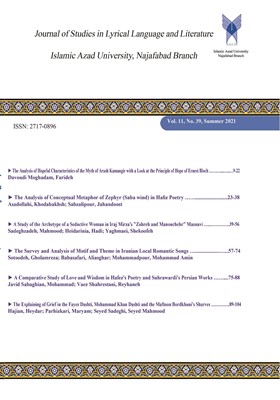Analysis Domination of the Beloved Over Lovers in the Manzoomeh Khosrow and Shirin Nezami of based on the Sociological Perspective of Lukacs, Bourdieu and Adorno
Subject Areas : Persian Language & LiteratureZahra Nourmohammadi Najafabadi 1 , Shahrzad Niazi, 2 , Mahboobeh Khorasani 3
1 - Ph.D. Candidate, Persian Language and Literature, Najafabad branch, Islamic Azad University, Najafabad, Iran.
2 - Assistant Professor of Persian Language and Literature, Najafabad branch, Islamic Azad University, Najafabad, Iran
3 - Associate Professor of Persian Language and Literature, Najafabad branch, Islamic Azad University, Najafabad, Iran
Keywords: Distinction, Domination Lover, Class base Lovers, Dialectics and unevenness love, Approach emic and etic, Intellectual physiognomy,
Abstract :
The poems of Khosrow and Shirin Hakim Nezami are among the famous Persian poems in the field of lyrical literature. The basis of the story is love. In this story, in which several loves are flowing, the position of the lover and the beloved is often shifting and fluctuating. The course of the story becomes sometimes normal and sometimes unconventional. One of the unconventional actions is the domination of the lover over the beloved. It was expected that in proportion to the gravity and magnetic field of the beloved, the proportionality of domination would be exercised in favor of the beloved, but; Contrary to expectations, we are witnessing fluctuations and changes in the position of our domination. In an interdisciplinary study using descriptive-analytical sources, documents and library tools, this study examines the nature and reasons for the fluctuation of lover domination in these systems from a sociological perspective, based on the views of George Lukács, Pierre Bourdieu and Theodore Adorno. Because; Behavior is derived from the psyche. This study also approaches psychoanalytic critique. Findings show: hegemony of power, class bases, objects and mentalities of society and the poet; the fluctuation of domination has been in favor of the upper classes, and this dialectic has led to a military attitude and approach to the fluctuation of domination.
آدورنو، تئودور؛ هورکهایمر، ماکس (1384). دیالکتیک روشنگری. ترجمة مراد فرهادپور و امید مهرگان. تهران: گامنو.
آگبرن، ویلیام؛ نیمکوف، مایر (1350). زمینۀ جامعهشناسی. ترجمة امیرحسین آریانپور. تهران: گستره.
باتامور، تام. (1380). مکتب فرانکفورت. ترجمه حسینعلی نوذری. تهران: نی.
برن، ژان (1363). افلاطون. ترجمه سید ابوالقاسم پور حسینی. تهران: موسسه نشر هما.
بوردیو، پییر (1388). درسی دربارۀ درس. ترجمه ناصر فکوهی. تهران: نشرنی.
بوردیو، پییر (1389). سلطۀ مردانه. ترجمه رحیم هاشمی. بیجا، بینا.
بوردیو، پییر (1396). نظریۀ کنش: دلائل عملی وانتخاب عقلانی. ترجمه مرتضی مردیها. تهران: نقش و نگار.
بوردیو، پییر (1399). تمایز: نقد اجتماعی قضاوتهای ذوقی. ترجمه حسن چاوشیان. تهران: نشر ثالث.
روستاخیز، بهروز؛ آذرشب، عطیه (1396) تأملی بر رهیافت تفهمی تفسیری در روششناسی انسانشناختی. ماهنامه پژوهشهای تاریخی، اجتماعی، سیاسی. 1 (2)، 78-69.
سعدی، شیخمصلحالدین (1381). غزلیات. مطابق با تصحیح محمدعلی فروغی. تهران: کلک آزادگان.
سعیدی سیرجانی، علی اکبر (1367). سیمای دو زن (شیرین و لیلی در خمسه نظامی). تهران: نشر نو.
سلیمانی، محسن (1374). تأملی در باب داستان. ج.2. تهران: انتشارات امیرکبیر.
شمیسا، سیروس (1383). انواع ادبی. ویرایش سوم. تهران، فردوس.
فروم، اریک. (1391). به نام زندگی. ترجمه اکبر تبریزی. تهران: نشر فیروزه.
فکوهی، ناصر (1394). تاریخ اندیشه و نظریههای انسانشناسی. تهران: نشر نی.
فورستر، ادواردمورگان (1375). جنبههای رمان. ترجمه ابراهیم یونسی. تهران: انتشارات نگاه.
لوکاچ، جورج، (1395). نقد و فرهنگ. ترجمه اکبر معصوم بیگی. تهران: موسسه انتشارات نگاه.
لوکاچ، جورج (1391). رمان تاریخی. ترجمه شهلا فیلسوفی. تهران: نشر اشاره.
معصوم، حسین (1384) مفهوم دیالکتیک در فلسفه افلاطون. اندیشههای فلسفی3. 1 (3)، 119-107.
نظامی گنجوی، الیاس بن یوسف (1376). خسرو و شیرین. تصحیح و تحشیه حسن وحید دستگردی. تهران: قطره.
نظامی گنجوی، الیاس بن یوسف (1376). لیلی و مجنون. تصحیح و تحشیه حسن وحید دستگردی. تهران: قطره.
_||_Adorno, Th.; Horkheimer, M. (2005). The dialectic of the enlightenment. M. Farhadpour and O. Mehregan (Trans.). Tehran: Gameno.
Agburn, W.; Nimkov, M. (1971). Sociology. Amirhossein Arianpoor (Trans.). Tehran: Gostareh.
Batamor, T. (2001). Frankfurt school. Hosseinali Nozari (Trans.). Tehran: Ney.
Bern, J. (1984). Plato. A. Hosseini (Trans.). Tehran: Homa Publishing Institute.
Bourdieu, P. (2009). Lesson on lesson. N. Fakuhi (Trans.). Tehran: Nashrni.
Bourdieu, P. (2010). Male domination. R. Hashemi (Trans.). N. Lo: N.P.
Bourdieu, P. (2017). Theory of action: Practical reasons and rational choice. M. Mardiha (Trans.). Tehran: Naghsh and Negar.
Bourdieu, P. (2020). Distinction: Social critique of taste judgments. H. Chavoshian (Trans.). Tehran: Sales.
Fakuhi, N. (2015). History of Anthropological thought and theories. Tehran: Ney Publishing.
Forrester, E. M. (1996). Aspects of the novel. E. Younesi (Trans.). Tehran: Negah Publications.
Forum, E. (2012). In the name of life. A. Tabrizi (Trans.). Tehran: Firoozeh Publishing.
Lukacs, G. (2012). Historical novel. Shahla Filsofi (Trans.). Tehran: Nashr Publishing.
Lukacs, G. (2016). Critique and culture. A. Masoumbeigi (Trans.). Tehran: Negah Publishing Institute.
Masoom, H. (2015). The concept of dialectics in Plato's philosophy. Philosophical Thoughts 3. 1 (3), 119-107.
Nezami Ganjavi, I. (1997). Khosrow and Shirin. H. Vahid Dastgerdi (Emend.) Tehran: Qatreh.
Nezami Ganjavi. I. (1997). Lily and Majnoon. H. Vahid Dastgerdi (Emend.). Tehran: Qatreh.
Sa’di, M. (2002). Lyric poems. M. Foroughi (Emend.). Tehran: Kelk Azadegan.
Saeedi Sirjani, A. (1988). The image of two women (Shirin and Lily in Khamseh Nezami). Tehran: Nashr-e Now.
Shamisa, S. (2004). Literary genres. Third Ed. Tehran: Ferdows.
Soleimani, M. (1995). Reflections on the story. Vol. 2. Tehran: Amirkabir.
Rustakhiz, B.; Azarshab, A. (2017). Reflection on the interpretive understanding approach in anthropological methodology. Monthly Journal of Historical, Social and Political Research. 1 (2), 69-78.


